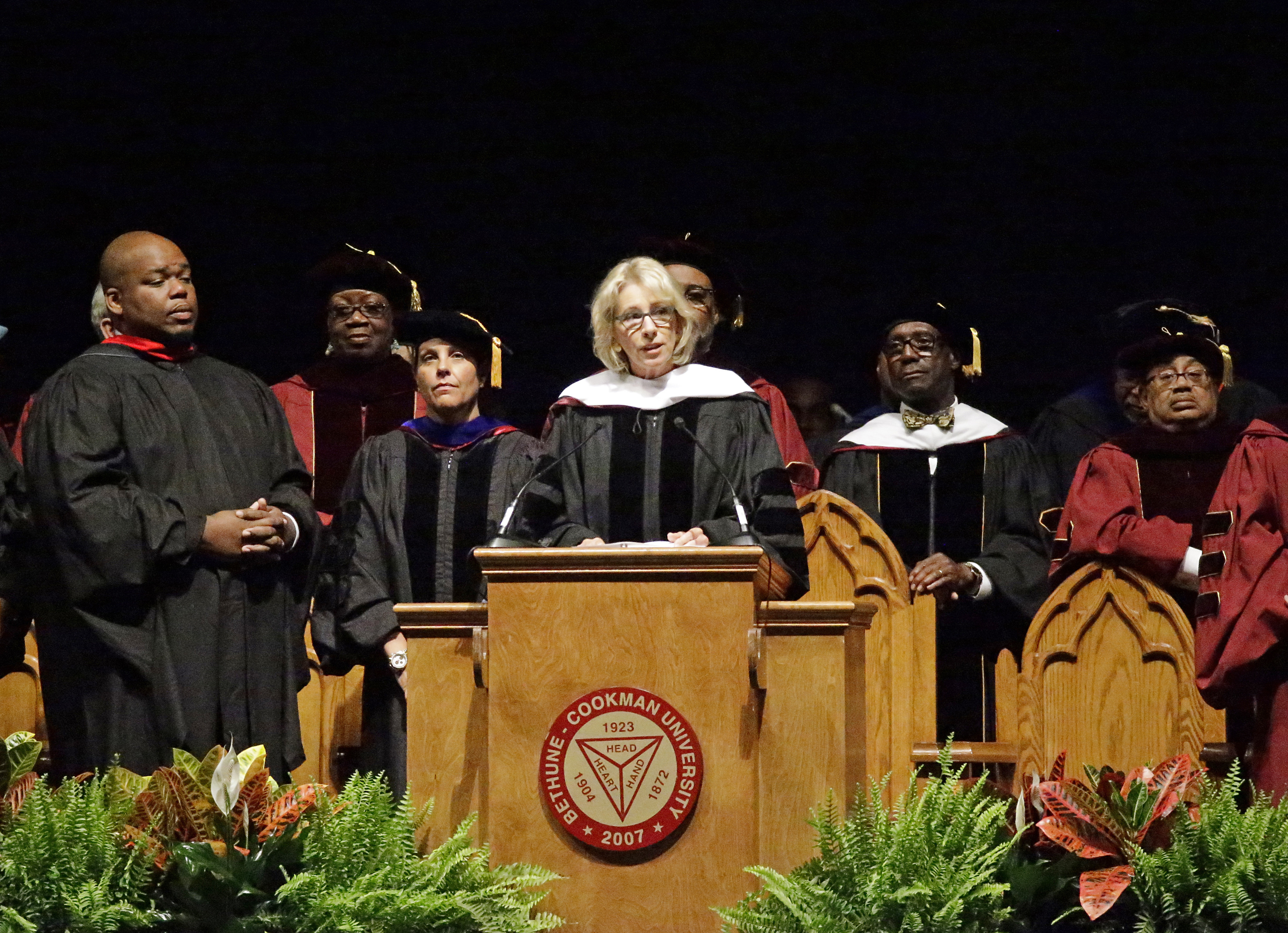
Secretary of Education Betsy DeVos delivers a commencement speech to graduates at Bethune-Cookman University, Wednesday, May 10, 2017, in Daytona Beach, Fla. (John Raoux/AP)
It’s college graduation season, and that often brings demonstrations against commencement speakers.
At Notre Dame last weekend, dozens of students walked out of their ceremony during Vice President Mike Pence's speech.
That protest follow incidents this semester at Vermont's Middlebury College and the University of California Berkeley where demonstrators aggressively shut down conservative speakers Milo Yiannopoulos and Ann Coulter.
Many college administrators are faced with the tricky task of permitting activism while protecting free speech.
At the historically black Bethune-Cookman University in Florida, U.S. Education Secretary Betsy DeVos delivered her commencement speech to a chorus of boos. Some students turned their backs.
“One of the hallmarks of higher education and of democracy is the ability to converse with and learn from those with whom we disagree,” DeVos told the graduates.
Students were upset about the secretary’s previous remarks characterizing historically black universities as pioneers of the school choice movement.
In fact, these universities were founded following the Civil War to enroll black students shut out of southern schools.
At one point during DeVos’ speech, Bethune-Cookman President Edison Jackson interrupted the secretary, hoping to settle the crowd.
“If this behavior continues, your degrees will be mailed to you,” Jackson admonished the graduates.
DeVos was able to finish her address, but it was just one recent example of freedom of speech on campus clashing with the freedom of students to protest.
Of course, controversial speech on campus isn’t new, but many of the administrators we’ve interviewed say the tone and nature of debate has changed since November.
“I think the political dialogue that we encountered during the election has given voice to some very extreme views and some of our students have those views and I think that is creating some challenges on campus,” said Kevin Kruger, president of the national organization Student Affairs Administrators in Higher Education.
Kruger says in today’s heated political climate, administrators should not act surprised if students protest a commencement speaker.
“There should be a protocol in place for how you would deal with disruption to the event, so that dissent can occur but that the actual speech is not disrupted,” Kruger said.
In Vermont, Middlebury College has disciplined 67 students for their involvement in protests that disrupted and shut down a lecture by conservative writer Charles Murray.
Forty one of the students received sanctions from the administration. Twenty six others were sanctioned by the college's Community Judicial Board. Individual hearings were held this month.
In March, students turned their backs and shouted during Murray's lecture, and the professor interviewing him was injured as she exited the auditorium. Police say they won't seek criminal charges because they were unable to identify any students responsible for the professor's injuries.
Kruger points out that there’s a fine line between allowing dissent and shutting down a speech altogether.
“There’s a strong tradition in our colleges and universities about not just free expression but the marketplace of ideas, and you may not like what someone says but we all want to respect the right to say it, unless the speech is harmful or violent or oppressive or incites people to violence,” Kruger said.
Back in 2006, students and anti-Iraq War protesters lined Beacon Street, protesting Secretary of State Condoleezza Rice and her commencement address at Boston College.
At the time, World War II veteran Alden Poole told WGBH’s Greater Boston that Rice’s message was un-Christian.
“I could go on for hours about what the Catholic Church stands for and what Condoleezza Rice stands for,” Poole said. She’s one of the architects of this war.”
Inside Alumni Stadium, though, the Secretary of State gave her speech uninterrupted.

U.S. Secretary of State Condoleezza Rice delivers the commencement address at Boston College in 2006. A few students turned their backs but more stood to applaud as Rice received an honorary degree and addressed graduates. (Chitose Suzuki/AP)
“What really matters is not what you have learned and not what is said to you on this day, but what you do with all of the days ahead of you," Rice said, concluding her speech to a standing ovation.
On campus, Boston College spokesman Jack Dunn recalls only a few students and faculty turned their backs.
“Threats of protests caused parents to clearly state their preference that the day go without incident and so there were no protests whatsoever inside the stadium,” Dunn said, adding that Boston College has not shied away from controversial speakers since 2006.
“The students want a named entity, so you can play the safe card and have your obscure philosopher or poet, but then you’d be sacrificing your principle,” Dunn said.
And with the country so deeply divided, many administrators say, colleges have an obligation to make sure all voices are heard, however controversial.
Earlier: Are College Administrators Stifling Free Speech On Campus?










